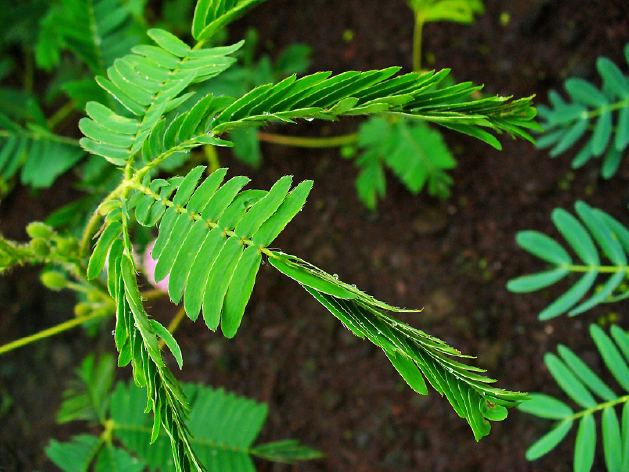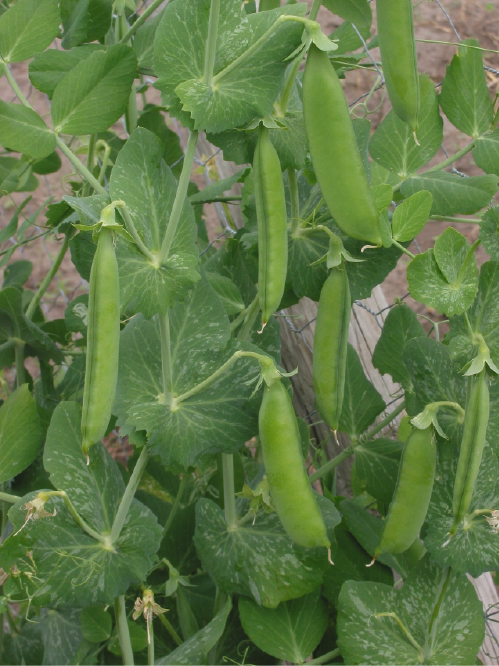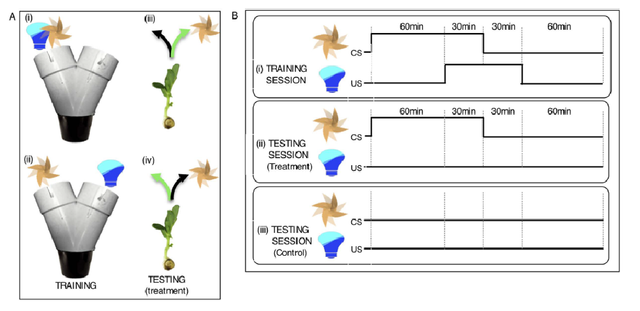Plants Can Learn From Experiences... Yes You Read That Correctly.
Today I invite you to take a trip with me and dive for at least a brief moment into the mind of a plant. Now I am sure you are sitting in your chair (or lying, or standing or something... you're somewhere I just know it!) thinking to your self, @justtryme90 you idiot PLANTS DON'T HAVE BRAINS! You can't form memories without a brain! I say to you, thats what I thought as well but apparently plants have other ideas.
Today we will briefly discuss a recent (and fascinating!) publication in Nature: Scientific Reports titled "Learning by Association in Plants."

Orienting Your Mind To The Fact That Plants Can Have A Memory And Can Learn From It
The image above is of the plant Mimosa pudica otherwise known as the sensitive plant. This particular plant is not the focus of the study but it is what I will use to get your mind in the right state. If you are not familiar with this plant it is responsive to touch:

As you can see, when the plant is touched it constricts its leaves. It also does this despite the lack of both a brain and a nervous system! How does it work? Calcium channels. These are basically protein pores in the plants cell walls that shuttle calcium ions in or out of the cell, if you recall from chemistry calcium (Ca2+) ions have a positive charge, when you change the concentration of calcium inside the cell you can create/vary the strength of the electrical imbalance between the internal charge and external charge. This electrical imbalance creates what is known as a membrane potential (a voltage) across the cells membrane.
It is the induction of these membrane potentials that signal to the motor cells of the plant to cause the leaves to constrict like you see in the gif above (Source). Pretty neat! I explain this because it shows you a way that plants have to detect a stimulus, and if you can detect a stimulus then you can also prepare your self (chemically speaking) for the stimulus if it regularly happens.
In the case of the Mimosa pudica experiments were performed where water was dropped repeatedly on the plant causing the leaves to curl. You would think, well it's just a dumb plant, it's going to keep curling forever.... BUT eventually the plants stopped closing their leaves due to the water droplets. The plants figured out that nothing bad was happening to them, so they were just wasting energy constricting those leaves. (Source) The only way this can happen is for plants to have some sort of memory (maybe not like your or my memory, but it's a memory nonetheless).
So What About The New Publication?
In this article the authors were studying the garden pea, Pisum sativum.

The article discusses the importance of light to plants, as light is essential for both growth and survival of the plant. The plant's ability to detect queues from changing light hours are important for maximizing the amount of energy the plant is able to absorb (though ramping up photosynthetic processes when light is available).
The authors discuss how recent publications indicated that plants have been observed to acquire new behaviors through habituation (the example above of how the Mimosa pudica stopped curling its leaves, that is an example of habituation, the plant "learned" to stop curling its leaves when that stimulus was observed to be doing no harm). In this study the researchers wanted to see if plants could learn through forming associations.
To test the authors classically conditioned the plant to be used to an 8 hours light, 16 hours dark cycle. This conditioning occurred in a maze with two chambers, and the light also coincided with a fan being active. In one test group the fan and the light were in the same chamber, in the other they were in separate chambers, and finally there was a control group with no fan just light.

The plants were "trained" for three days then tested for one day. The authors then tested the plants for one day where the plants were only exposed to the fan (no light). They wanted to see whether the plants associated the potential for a light source to come from the side that they were trained to associate it based on the fan blowing on them (aka would they grow towards the wind if they were in the light + fan trial, or against the wind if they were in the light on one side and wind on the other trial).
They found that the control group grew to the side of the chamber where the light was, which was expected. However for the groups being exposed to the fan they found that for the group where the light was on the same side as the fan 62% of the plants grew towards the fan, while for the group where the light was on the opposite side as the fan, 69% grew toward the side of the chamber away from the fan. Regardless of orientation of the plants in the chamber. The plants were able to associate the light, relative to the source of wind. They were able to Learn from the experience with the wind and grow where light would be expected based upon that information.
Now mind you 62% and 69% aren't amazingly high numbers but a repeatable phenomenon is a repeatable phenomenon and would indicate there is more to a plants "mind" then meets the eye.
Additional Sources
- http://www.nature.com/articles/srep38427
- https://www.ncbi.nlm.nih.gov/pmc/articles/PMC2634336/
- http://www.sci-news.com/biology/science-mimosa-plants-memory-01695.html
- https://theconversation.com/pavlovs-plants-new-study-shows-plants-can-learn-from-experience-69794
- https://en.wikipedia.org/wiki/Mimosa_pudica
- https://en.wikipedia.org/wiki/Pea
All non Cited Images Are Available Under Creative Commons Licenses, The Primary Article From Nature: Scientific Reports is also Open Access and Available for Use Under Creative Commons Lisences
All Gifs Are From Giphy.com and Are Also Available for Use Under Creative Commons Licences
If you like my work, please consider giving me a follow: @justtryme90. I am a PhD holding biochemist with a love for science. My future science blog posts will cover a range of topics in the biology/chemistry fields.
Thank you for your continued support of my work! I appreciate all those who follow me (and those who don't too).
Great resume!!
I love the surprising results from these kinds of experiments.
Nature adapts pretty well to its environment (maybe more than humans). At the end, this is nothing but some kind of proof of adaptation, isn't it?
Well is not learning an adaptation?
Definitely! I have never said the contrary :)
Fascinating Nature. I actually performed the mimosa experiment some time ago in Ecuador myself. The leaves were curling for quite some time, but then gradually stopped to react when I touched them. So could it also be that the plant is only exhausted after some time? :)
That depends, does it continue to be exhausted if you keep regularly touching it. Or start closing again after some time, despite your regularly touching it.
I don't know because I just touched it several times in a short period and then never again ;)
But I'll try that out if I get the chance again in the future :-)
Good post, but obfuscating the terms ;). Plants don't "learn". Nor do they "feel". These are projections of symbolic word reference in order to analogously correspond an understanding we are familiar with to something else that isn't the same. My recent post today dealt with a partial explanation on this topic as well. Plants have responses to stimulus based on a basic bio-nature electro-chemical potential variance to the environmental factors and pressures.
Some have more sophisticated response devices for optimization of longevity until expiration and decay. We have many parts with us that don't require a conscious presence, although everything is attached to our brain to function. We don't need to think to breathe, or digest food, etc. Basic biological level functionality operates automatically from stimulus-response basics. No real "learning" or "feeling", but yes sensory apparatus for input/stimulus to process and output/respond at a basic level. There is adaptability, at that basic biological level, that can change their method of response to stimulus, and they can even revert back to their former "self" so to speak hehe. But a better use of terminology is something I've already spoken about before in this topic, so I already know the issues to respond here ;)
That's my gripe. Distinction is what we are talking about, because the words matter. I can get into the etymology if you want. You can go look it up and understand how those words really reference reality. Good post to show what plants can do. Plants are the lifeforce for the planet. They provide the soil for the growth of food and all the other plants.
I don't agree with you here. I don't know that what we associate as learning is anything more than a chemical/electrical state in our minds. I don't think that the simplistic chemical memory that plants appear to be exhibiting in this and previous studies (to a lesser extent) are outside the realm of acceptably being called learning.
Now vegetarians are really in trouble haha
Watch out for PETP (People for the Ethical Treatment of Plants)
Amen!